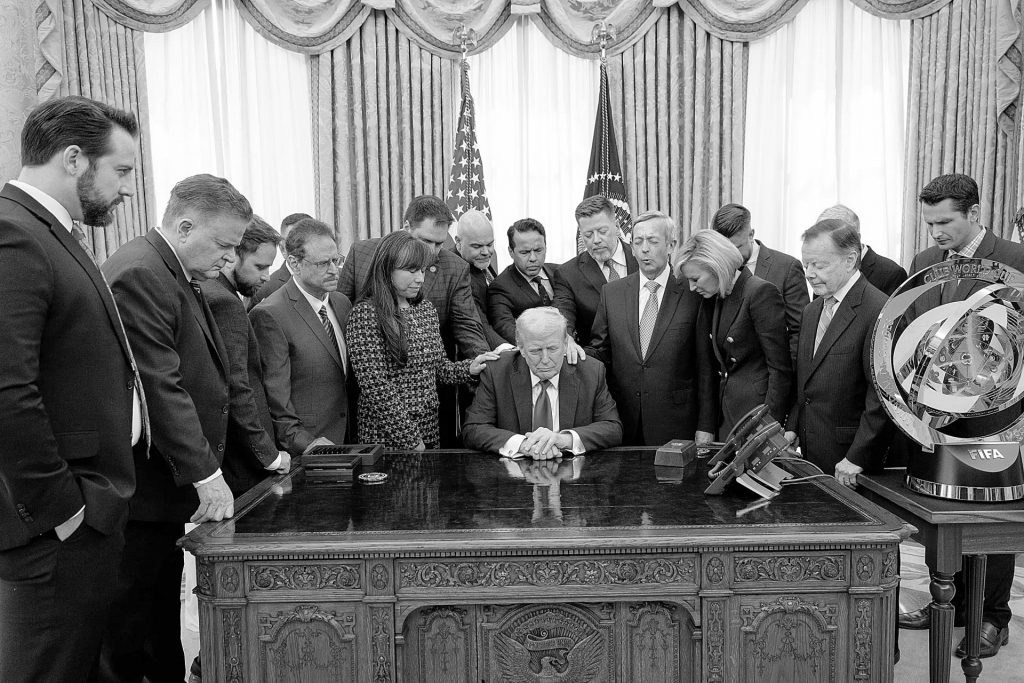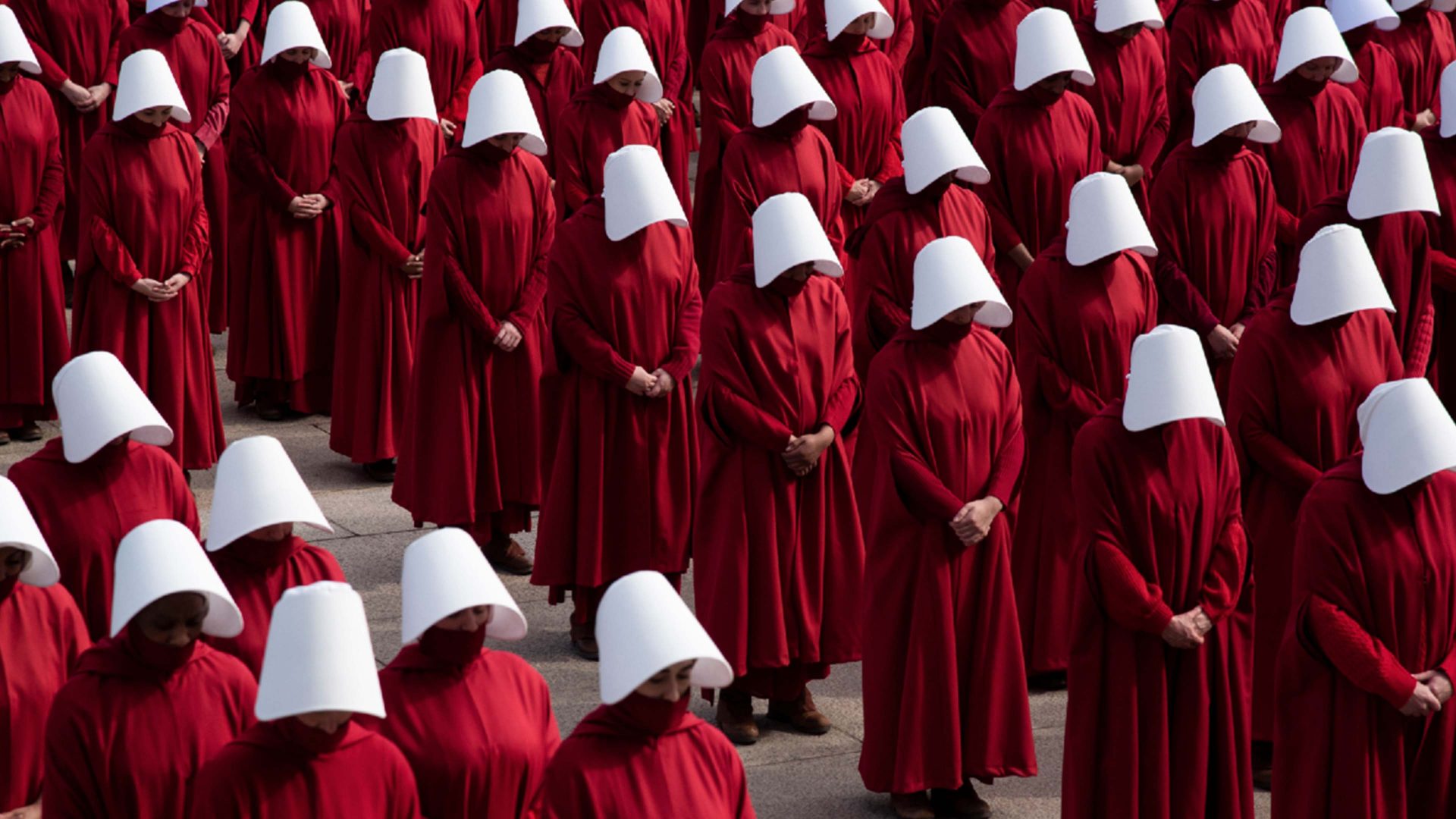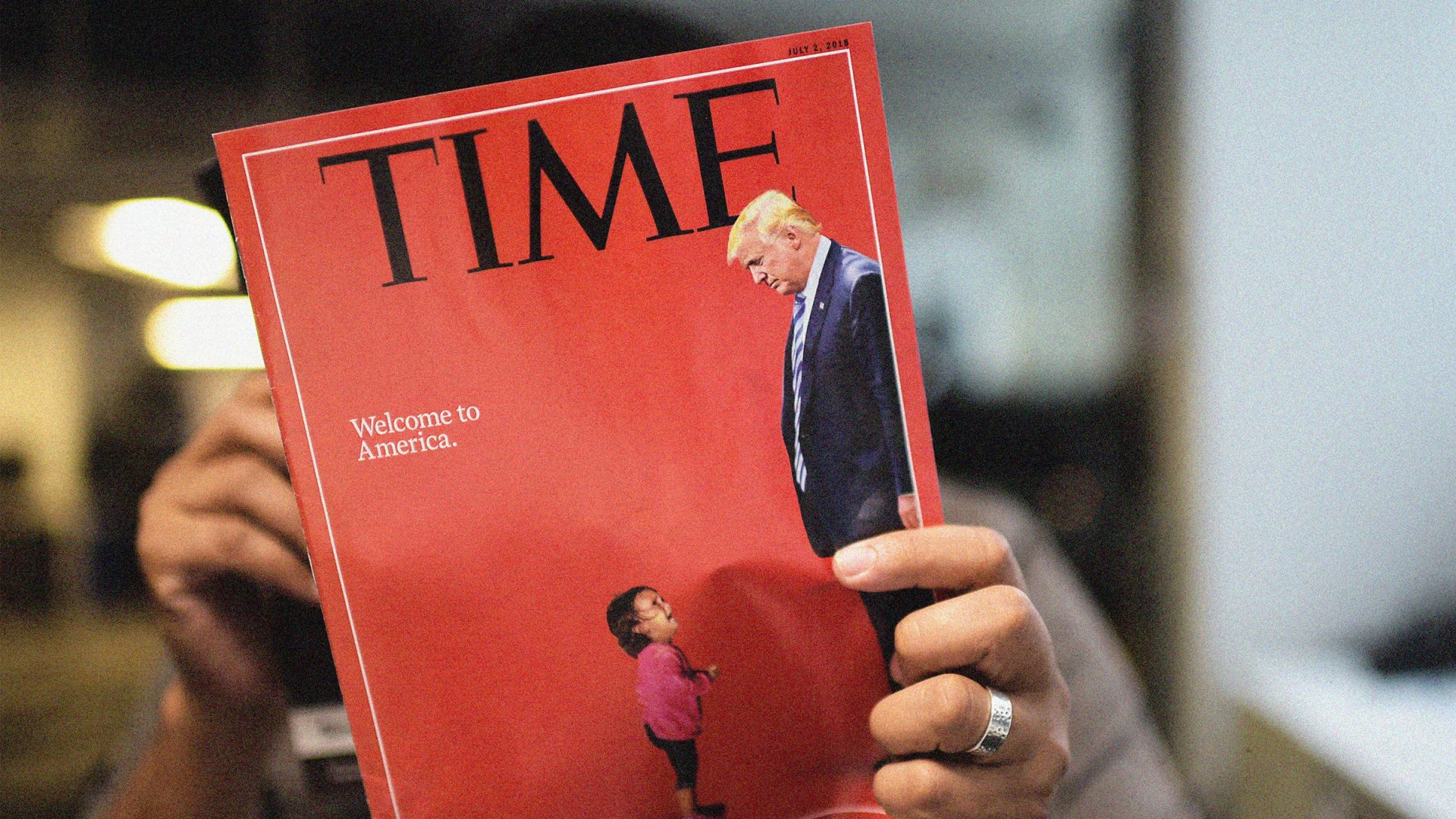The return of The Handmaid’s Tale to Channel 4 for its sixth and final season is a moment unexpectedly freighted with political and cultural significance. What started life as an episodic dramatisation of Margaret Atwood’s classic dystopian novel has become a compelling, unsettling and unmissable commentary upon the era of Donald Trump and MAGA.
Thus does culture converge with the demented convulsions of power – though, in this case, the collision was organic rather than premeditated. When the series, created by Bruce Miller and starring Elisabeth Moss, was first announced in April 2016, Trump had not yet secured the Republican presidential nomination. The notion of America succumbing to the worst impulses of the fundamentalist Christian right, transformed by patriarchal revolution into the nation of “Gilead”, was still what Atwood called “speculative fiction”. Nine years later, it no longer feels so speculative.
When the original novel was published in 1985, it was hailed as a masterly work of political imagination. The narrator Offred – played in the series by Moss – recalls how a brutally theocratic, misogynistic regime replaced the US republic. In the new age of Gilead, a ruthless elite of Commanders, calling themselves the Sons of Jacob, abolish the rights of women and enslave those who remain fertile as “handmaids”, serially raped in a horrific, pseudo-scriptural ritual to provide the ruling class with children.
Atwood’s astonishingly prescient insight was that, if the US yielded to tyranny, it would not emulate the secular totalitarianism of the 20th century. As she told The New York Times in 1986: “If you were going to do it, what would you do? What emotions would you appeal to? What groups would you utilise? How exactly would you go about it? Well, something like the way the religious right is doing things”.
What the Canadian novelist grasped was that there was a form of US exceptionalism that long predated the 1776 Declaration of Independence and the Constitution of 1788: that of the Pilgrim Fathers who made landfall on the Mayflower in 1620 and established the Plymouth Colony in what is now Massachusetts.
“We’re often taught in schools that the Puritans came to America for religious freedom,” Atwood said. “Nonsense. They came to establish their own regime, where they could persecute people to their heart’s content just the way they themselves had been persecuted”.
Trump could scarcely be described as a saintly figure. But for the 78 million self-described evangelicals in America, accounting for about a quarter of the electorate, he is a modern-day Cyrus: the pagan king who liberated the Jews from Babylonian captivity.
The support of the Christian base in 2016 was rewarded most conspicuously by his appointment of three conservatives to the US Supreme Court, which went on to overturn Roe v Wade in June 2022, ending women’s automatic constitutional right to an abortion.
As the television series gained traction, its writers expanded the world that Atwood had originally envisaged, with her endorsement and hands-on assistance. Offred’s real name was revealed to be June Osborne and her role as a leader of the resistance movement, Mayday, gradually established.
We followed her husband Luke (O-T Fagbenle) and best friend Moira (Samira Wiley) to Canada, where they joined the often-embattled refugee community. Offred’s Commander, unnamed in the book, was played by Joseph Fiennes as Fred Waterford, a senior figure in the Gilead apparat, whose wife Serena Joy (Yvonne Strahovski) was given a rich backstory: a devout, anti-feminist campaigner “in the time before” and champion of “biological destiny” who had prepared the ground for the new theocracy but, as a woman, was completely excluded from its high councils.
June’s love affair with Nick (Max Minghella), an “Eye” or member of the secret police who was later promoted to the rank of Commander, became the basis of a televisual love triangle. Viewers have also learned more of the “Aunts”, the “crack female control agency” that oversees the training of the handmaids, the most influential of whom is Aunt Lydia, played brilliantly by Ann Dowd.
Meanwhile, the show’s growing global audience and its 15 primetime Emmys introduced a new generation to the novel and its religious sayings, which quickly became ironic T-shirt slogans: “Under His Eye”, “Blessed day”, “May the Lord open”, “Praise be”, “Blessed be the fruit”. All over the world, women protesting against misogynistic measures have adopted the unmistakable handmaid’s uniform of red gown and white wings bonnet. After 34 years, Atwood wrote a sequel, The Testaments, which shared the 2019 Booker Prize and is now being developed as a spin-off series.
During Trump’s first presidency, I became convinced that The Handmaid’s Tale was a better guide to 21st century authoritarianism than George Orwell’s Nineteen Eighty-Four. The tale of Winston Smith’s failed rebellion against the Party and Big Brother remains, of course, uncomfortably resonant in its description of psychological repression, the manipulation of truth and history and the stamping out of dissidence.
Read more: The US brain drain is only just beginning
But, with uncanny accuracy, Atwood foresaw the role that religion, gender and the appetite for meaning would assume in the next wave of authoritarianism. Gilead has its toxic Colonies; Trump’s America has the Salvadoran gulag. Gilead has the Guardians and the Angels (“It wasn’t the army,” recalls Offred, “It was some other army”). MAGA has its militias and the 1,500 convicted January 6 insurrectionists, pardoned and back on the streets.
Trump’s ignorance of scripture and theology is as profound as you might expect. But he intuitively understands the mesmeric power of faith: its spectacle, drama and emotional impact. During the Black Lives Matter protests following the murder of George Floyd in May 2020, he deployed tear gas and riot police so he could make his way to St John’s Episcopal Church in Lafayette Square, Washington, where he held up a Bible. His message to white Christian America was clear: I am your anointed leader.
Nor was it an accident that, in March 2023, he launched his official presidential campaign in Waco: a sacred site for apocalyptic Christians, who laud the memory of David Koresh, the deranged cult leader whose compound was raided by federal agents in 1993.
MAGA’s religiosity became even more overt after Trump narrowly escaped assassination on July 13, in Butler, Pennsylvania. Interviewed six weeks later by the television psychologist Dr Phil McGraw in Las Vegas, he was asked why his life had been spared. He replied: “I mean, the only thing I can think is that God loves our country. And he thinks we’re going to bring our country back… It has to be God”.
Since his electoral triumph in November, the theocratic yearnings of the MAGA movement have revealed themselves quite brazenly. Trump has signed executive orders to launch a task force, overseen by the Justice Department, to “eradicate anti-Christian bias”. He has established a new Faith Office in the White House, led by his longtime personal pastor, Paula White-Cain, and a veteran of his first administration, Jennifer Korn.
Natalism – the urgent mission to restore falling birthrates – has also become a central feature of his second presidency. In 2023, America’s birthrate fell to a historic low of 1.62 babies per woman – well below the 2.1 that is needed, allowing for early mortality, to maintain what demographers call “replacement level”.
There are sound economic reasons for a nation to encourage childbearing: at minimum, every society needs future employees to pay for the care and pensions of the elderly. One solution is to be found in immigration. But this is not how the religious right in America (or Hungary, or Russia) frames the issue at all.
As in The Handmaid’s Tale, MAGA’s leaders regard infertility as, in JD Vance’s words, a “civilisational crisis”. The vice-president’s notorious attack on the “childless cat ladies” whom he claimed were running America was more than a nasty insult. It disclosed the ethnic and religious allegiances at the heart of the new right’s ideology.
Last week, the New York Times reported that the “White House has been hearing out a chorus of ideas… for persuading Americans to get married and have more children”. These draft proposals include a $5,000 bonus for mothers with newborns, described by Trump as a “good idea”, and an affirmative action plan that would allocate almost a third of Fulbright overseas study scholarships to people who are married or have children.
Read more: Could Megyn Kelly become president?
Just as the GI Bill in 1944 offered benefits to veterans, so these measures would explicitly incentivise parenthood and the formation of traditional families. Trump has also crudely declared himself “the father of IVF” and “the fertilisation president”.
This, in turn, reflects a growing grass-roots movement that champions a fresh embrace of old-fashioned gender roles and of childbearing as a civic and religious duty. In March, a special “NatalCon” was hosted in Austin, Texas, to turbocharge these objectives.
In Atwood’s novel, the founders of Gilead plot their coup in “top-secret Sons of Jacob Think Tanks”. In real life, their counterparts have done so in plain sight – most notoriously in Project 2025, the 920-page blueprint published in April 2023 by the Heritage Foundation.
The project makes four promises, all drawn from Christian nationalist ideology: “Restore the family as the centerpiece of American life and protect our children”; “Dismantle the administrative state and return self-governance to the American people”; “Defend our nation’s sovereignty, borders, and bounty against global threats”; “Secure our God-given individual rights to live freely — what our Constitution calls ‘the Blessings of Liberty.’” When the plan refers to “the book of human nature”, it means the Bible.
Though Trump kept his distance from the project during the campaign, he has since appointed its prime intellectual mover, Russell Vought, as director of the Office of Management and Budget, one of the most powerful agencies in Washington. In 2021, Vought, who believes that “the Right needs to throw off the precedents and legal paradigms that have wrongly developed over the last 200 years”, founded the Center for Renewing America in order “to renew a consensus of America as a nation under God”.
A loose-knit network of so-called “TheoBros” has also arisen, militantly supportive of Christian nationalism rather than traditional constitutionalism. They see the overturning of Roe as only the beginning: next in their sights are readily available contraception (“abortifacients”), subsidised STD tests and same-sex marriage.
At the heart of this increasingly forthright group is Vance, founder of the all-important Rockbridge Network, which oversees fundraising, messaging and activism for MAGA’s most committed. Trump has addressed the network’s gatherings and dispatched his designated chief of staff, Susie Wiles to its November retreat in Las Vegas, only days after the election.
Rockbridge was co-founded by Chris Buskirk, publisher and editor of American Greatness, a Christian nationalist news and opinion website. Here are a sample of its headlines: “Feminism Is Barbarism”; “Feminism Must Have Been Invented by a Diabolical Man”; “Snowflake Feminism”.
Vance also wrote the foreword to Dawn’s Early Light: Taking Back Washington to Save America, a best-selling, flame-eyed plan for Christian nationalism by Kevin Roberts, president of the Heritage Foundation, published a week after the election. Roberts rages against “Chinese antifamily, antinatalist propaganda” and argues that “if an American institution is incompatible with or contemptuous of public prayer, I would be hard pressed to believe that it should not be burned down for the common good”.

Such Biblical, anti-feminist propaganda was precisely envisaged in The Handmaid’s Tale, in which the Commander rationalises the destruction of women’s rights thus: “We’ve given them more than we’ve taken away… Think of the trouble they had before. Don’t you remember the singles bars, the indignity of high-school blind dates? The meat market…This way they all get a man, nobody’s left out. This way they’re protected, they can all fulfil their biological destinies in peace”.
Prominent among the new “TheoBros” – Gileadean commanders-in-waiting – is the author and podcaster Stephen Wolfe, whose book The Case for Christian Nationalism (2022) has become a key text for next-generation MAGA. Its central thesis is that America has become a godless “gynocracy”: “the governing virtues of America are feminine vices, associated with certain feminine virtues, such as empathy, fairness, and equality…gynocracy pacifies men by eliminating competitive, spontaneous coordination…gynocracy pathologizes masculinity… The rise of Christian nationalism necessitates the fall of gynocracy”.
In Atwood’s novel, the souls of public enemies are saved by capital punishment or “salvaging”, their cadavers left to hang on “the Wall” (“Sometimes they’ll be there for days”). Yet again, the gap between art and life is narrowing. Wolfe declares himself in favour of such executions on explicitly religious grounds: “arch-heretics….can be justly put to death”.
No less ferocious – and also a millennial – is the podcaster and radical pastor Joel Webbon, author of Fight By Flight: Why Leaving Godless Places is Loving Godless Places (2023), who campaigns for the repeal of the 19th Amendment that secured women’s right to vote. “I don’t want to see women in the public sphere,” he has said. “Women should not hold civil office. Women – their primary place is a domestic and feminine role of nurturing – it should be in the home…a godly woman is a woman of the hearth and what that means is that she’s a woman whose feet are not constantly leaving her home, being a busybody, going here and going there. She’s in her home. Her business is about her children…Men are meant to be kings”.
There was a time when such figures could be dismissed as extremists and marginal fanatics; but no longer. In Vance, defense secretary Pete Hegseth, Vought, the leaders of the White House Faith Office, they have allies at the very apex of the administration – not to mention in the Supreme Court.
Crucially, the TheoBros tend to be in their late thirties or forties, their eyes quietly but firmly fixed on the evolution of MAGA after Trump. They speak of “Big Eva” – the evangelical movement – as a parallel to “Big Tech” or “Big Pharma”: the force that will end discredited constitutionalism and replace it with scriptural authority. As Roberts put it in July: “We are in the process of the second American Revolution, which will remain bloodless if the left allows it to be”.
How easy some still find it to assume that incompetence and the faltering US economy will necessarily do for the president and his disciples, that a return to normal (whatever that now means) is inevitable. But it is in this respect, above all others, that The Handmaid’s Tale is such a vividly contemporary text.
As Offred recalls, complacency is complicity: “We lived, as usual, by ignoring. Ignoring isn’t the same as ignorance, you have to work at it. Nothing changes instantaneously: in a gradually heating bathtub you’d be boiled to death before you knew it…. The newspaper stories were like dreams to us, bad dreams dreamt by others. How awful, we would say, and they were, but they were awful without being believable. They were too melodramatic, they had a dimension that was not the dimension of our lives. We were the people who were not in the papers. We lived in the blank white spaces at the edges of print. It gave us more freedom. We lived in the gaps between the stories”.
This is where we are now, in America and beyond its shores. Atwood’s book and the tremendous television saga it has inspired are not only about authoritarians. They are also about us, and the untruths with which we continue to comfort ourselves on the path to tyranny. As Aunt Lydia often says: Gilead is within.




